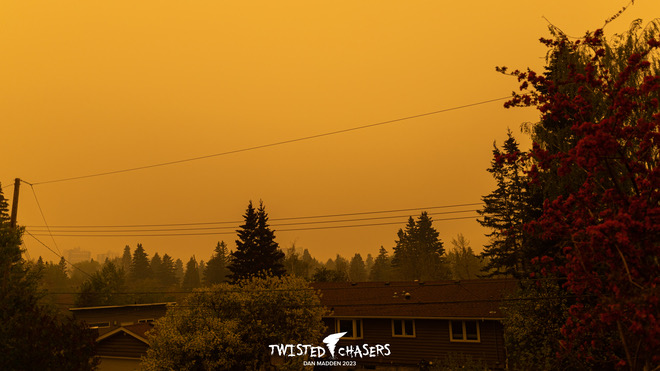Environment Canada is warning of poor air quality and reduced visibility in the Calgary area as wildfire smoke blows in.
On Tuesday, the Air Quality Health Index (AQHI) listed Calgary at a very high risk, falling to a moderate risk by Wednesday as conditions are expected to improve.
The general population is asked to reduce or reschedule strenuous activities outdoors, especially if symptoms such as coughing, and throat irritation occurs.
“Wildfire smoke can be harmful to everyone’s health even at low concentrations,” an Environment Canada special air quality statement said.
During wildfire season, Albertans can take action to reduce their exposure to smoke.
“People with lung disease, such as asthma, or heart disease, older adults, children, pregnant people, and people who work outdoors are at higher risk of experiencing health effects caused by wildfire smoke,” the statement said.
Albertans are encouraged to speak with their health care provider to develop a management plan for wildfire smoke events and maintain a supply of any necessary medications during the wildfire season.
“Stop or reduce your activity level if breathing becomes uncomfortable or you or someone in your care feel unwell,” the statement said. “People respond differently to smoke. Mild irritation and discomfort are common and usually disappear when the smoke clears. Drinking a lot of water can help your body cope with the smoke.”
Albertans who must spend time outdoors, are encouraged to use a respirator-type mask, such as an N95, that does not allow air to pass through small openings, reducing exposure to particles in the smoke.
“These fine particles generally pose the greatest risk to health. However, respirators do not reduce exposure to the gases in wildfire smoke. It is important to listen to your body and reduce or stop activities if you are experiencing symptoms,” the statement said. “Be sure to check on people in your care and those around you who may be more susceptible to smoke.”
The statement added, reducing sources of indoor air pollution, by avoiding smoking indoors, burning incense and candles, frying foods, and using wood stoves can also help.
For more information visit the Alberta Health Services website.
Visit the Environment Canada website for information on current and forecast AQHI values.








